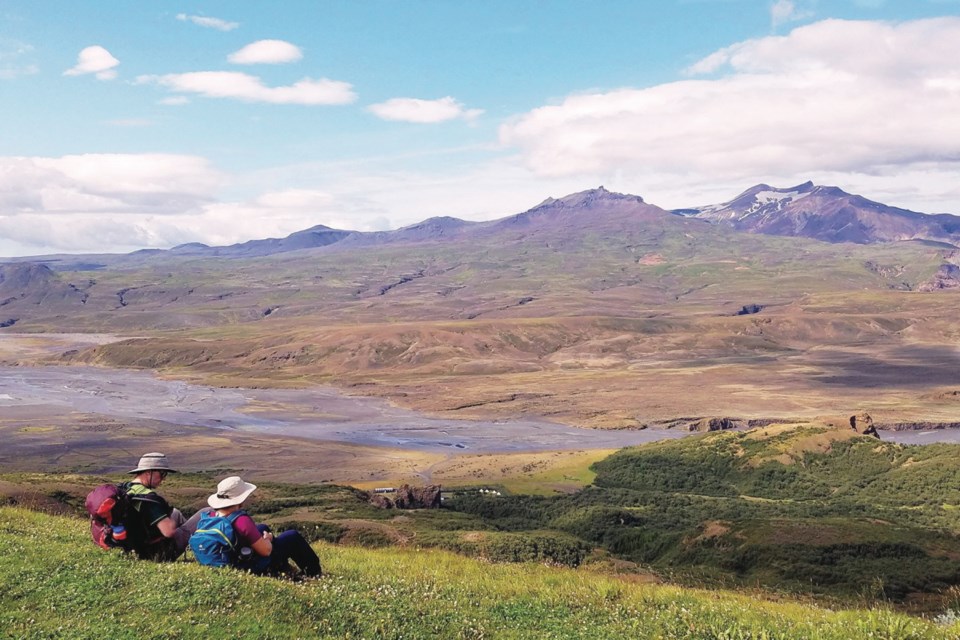As we’ve had to postpone our travels because of the pandemic, I believe a weekly dose of travel dreaming can be good medicine. Here’s a reminder of the fun that awaits us in Europe at the other end of this crisis.
Iceland, with cinematic scenery showcasing nature in its rawest form, thrills outdoorsy travellers. Known for the midnight sun and northern lights, this fascinating island is equally famous for its magnificent glaciers and volcanoes.
Among the country’s unforgettable experiences is a tour into a dormant volcano. The Thríhnúkagígur volcano, a half-hour drive from Iceland’s capital city Reykjavík, last erupted about 4,000 years ago. When its magma drained out, a cavity big enough to hold the Statue of Liberty remained.
Today, via a pricey six-hour Inside the Volcano tour (which includes three-kilometre hikes to and from the volcano), you can ride a lift through a squeezy opening at the volcano’s top, then 122 metres down into its vast chamber. Inside, lamps bring out the chamber’s pastel colors, and water, seeping through its ceiling, rains down lightly as you explore the bouldery floor.
For a shorter (one-hour) and much cheaper volcanic experience, you can visit Raufarhólshellir, billed as The Lava Tunnel — a 40-minute drive from Reykjavík. This 5,000-year-old lava tube was carved by a river of molten rock that was forced to burrow deeper after its surface had hardened. When the lava drained out, it left behind an extensive tunnel covered in colourful formations.
After passing beneath a few “skylights” where the ceiling had collapsed, you enter the intact lava tube — as big as a railroad tunnel in places. Subtle lighting brings out the tube’s soft colours and fanciful features. At the turnaround point you can experience a few minutes of utter darkness when the guide shuts off the lights.
Above ground, glacier hiking is a quintessential Icelandic experience. About 10% of Iceland is covered by glaciers, and the Sólheimajökull glacier on the South Coast is one of the most accessible.
There, several companies offer excursions of varying lengths and difficulty. A half-day outing with Icelandic Mountain Guides starts with a walk past an iceberg-filled lagoon to the foot of the glacier. Then the guide helps attach spiky crampons to your boots for the climb up spooky-looking canyons of ice and black ash.
Once on top, Sólheimajökull is smoother and whiter. As you crunch across the ice, the guide explains how the glacier moves, where those mysterious cones of black ash come from, how gaping sinkholes appear, and how climate change is melting the ice so rapidly that Sólheimajökull could disappear within a century.
Even on regular land, Iceland is a wonderland for hikers. Tórsmörk — “Thor’s Woods” — is a top destination, with well-marked trails leading to thrilling views over volcanoes, glaciers, and valleys.
Since it’s accessible only on gravel roads that require fording rushing rivers and streams, most visitors get there aboard specially equipped, jacked-up buses.
The main reason to visit Tórsmörk is the glorious hike to the top of Valahnúkur mountain. Starting from the visitors complex in Húsadalur Valley, the hike to the summit is less than two kilometres, but it’s staircase-steep in stretches and gains 275 metres in elevation.
On top, your sweat earns you a commanding view of three glacier-topped volcanoes, including the notorious Eyjafjallajökull, whose 2010 eruptions choked European air travel. Far below, the wide Markárfljót river valley sprawls to your north and the Krossá river valley to the south, their glacier-fed torrents rushing toward the sea.
For those who prefer that someone else do the hiking, horseback riding in Iceland is a special experience.
The descendants of ponies brought here by Viking settlers, Icelandic horses are small, strong and docile.
They’re renowned for their five gaits: Along with walk, trot and gallop, they have two extra “gears” — the tölt, which is fast and extremely smooth, and the high-speed “flying pace.”
A whale-watching cruise offers a more leisurely experience and a chance to spy the elusive whales of the North Atlantic. You can expect to see dolphins, porpoises and midsize minke whales (seen on local menus) rather than big humpback or blue whales.
Several tours depart from Reykjavík, but locals say the best whale-watching is in North Iceland, from the towns of Húsavík and Akureyri.
For all its ruggedness, Iceland also has its comforts — an abundance of thermal baths heated by the island’s geothermal energy. From touristy “premium” baths such as the Blue Lagoon to municipal pools favoured by locals, a thermal bath is only a short drive. Imagine wrapping up a vigorous day of exploring Iceland’s magnificent outdoors with a soothing soak in 38 C water. Aaaaahhh!
From volcano chamber explorations to geothermal pool plunges, Iceland offers adventures and activities that you can’t easily do anywhere else.
Rick Steves (ricksteves.com) writes European travel guidebooks and hosts travel shows on public television and public radio. Email him at [email protected] and follow his blog on Facebook.



